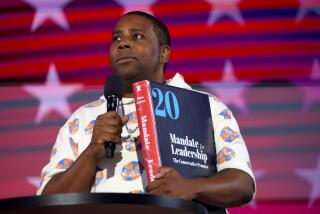Shortly before his death, Tucker transferred thousands of dollars in campaign funds to his relatives
When he died two weeks ago, veteran Assemblyman Curtis R. Tucker left behind more than a legacy of public service.
In the weeks before he succumbed to liver cancer, the longtime Inglewood Democrat transferred thousands of dollars in campaign funds to his son, his daughters, other relatives and top legislative staffers.
Even though there were no visible signs of a campaign in the solidly Democratic district that Tucker represented for 14 years, his son, Curtis Tucker Jr., maintains that all of the payments were for campaign-related work in the Nov. 8 general election race against Republican businessman Michael Davis.
“There may not have been an active campaign as far as what the public was seeing,” the younger Tucker said. “A lot of work was done unnoticed on candidate background and weaknesses.” He said none of the transfers constituted a personal use of campaign funds, which is illegal.
The transfers were detailed in the assemblyman’s last campaign finance statement filed Oct. 5 with the secretary of state’s office, which says that Tucker’s campaign committee spent $53,064 from July 1 to Sept. 30.
Much of that money went to the assemblyman’s children and employees. The payments included $8,250 to daughter Lorraine Gibbs; $7,600 to daughter Christy Tucker; $3,000 to Tucker’s Inglewood administrative assistant, Patricia Decuir; $1,500 to Hermanita Harris, his campaign treasurer who also is Inglewood’s city clerk; $800 to son-in-law Michael Trammel, and $502 to administrative assistant Tracey St. Julien in Sacramento.
The assemblyman’s campaign reports for the first half of the year show additional payments to his daughters, their husbands and legislative staffers for campaign work.
Gibbs received $10,877 and Christy Tucker was paid $4,100 between Jan. 1 and June 30. During that period, Tucker was fending off a Democratic primary challenge from Inglewood City Councilman Daniel Tabor. Trammel received $8,800 and Tucker’s other son-in-law, John Gibbs, was paid $8,000 in the first half of the year. Administrative assistant Decuir received $7,100, and treasurer Harris received $1,500.
The 70-year-old lawmaker spent most of the summer undergoing chemotherapy at Daniel Freeman Hospital in Inglewood. After the latest reporting ended, Tucker transferred most of the $34,197 remaining in his campaign treasury to his son, who formed a campaign committee to run for his father’s seat.
The younger Tucker, an aide to Assemblywoman Gwen Moore (D-Los Angeles), confirmed in an interview last week that the transfer of funds had taken place. He would not discuss the exact amount, which must be reported to state officials this week.
The 50th Assembly District that Tucker represented--which includes Inglewood, El Segundo, Lennox, and parts of Westchester and South-Central Los Angeles--is so solidly Democratic in registration and history at the polls that Tucker’s reelection this fall was never in doubt. Despite his death, he is expected to get most of the votes, forcing a special election early next year.
But Tucker’s son said a campaign will be launched nonetheless to urge voters to cast their ballots for the late assemblyman to ensure that the seat remains in Democratic hands. “We are not taking anything lightly for this November’s election,” Tucker said.
Fearing that the Republicans might wage a last-minute campaign, Tucker loyalists plan to send mailers to Democratic voters attempting to counter Republican Davis’ claim to be “the only live candidate in the race.”
“There is a lot of confusion right now,” Tucker said. “A vote for my father is not a vote for a dead man. It is a vote to keep the democratic process alive. We’ve got to get that word out.”
Tucker said he and Assembly Speaker Willie Brown (D-San Francisco) ruled out a write-in campaign in the time remaining before this November’s election because it would be too confusing.
The late assemblyman’s statement proved again the power of incumbent lawmakers to raise campaign funds. Tucker collected $22,500 during the summer from special interest groups while he was in the hospital.
The report shows that he received contributions of $500 or more from trial lawyers, pharmaceutical manufacturers, hospitals, medical groups, labor unions, public employee organizations, horse-racing interests, utilities and an oil company.
More to Read
Get the L.A. Times Politics newsletter
Deeply reported insights into legislation, politics and policy from Sacramento, Washington and beyond. In your inbox three times per week.
You may occasionally receive promotional content from the Los Angeles Times.










